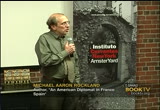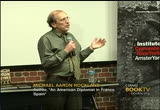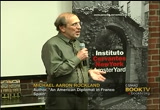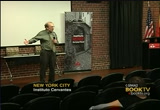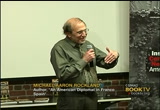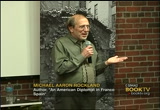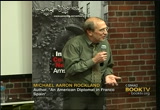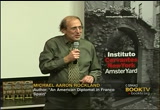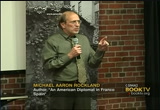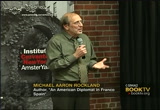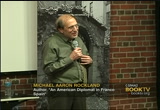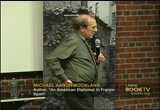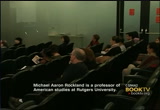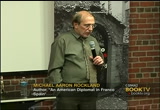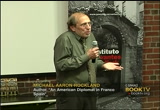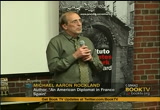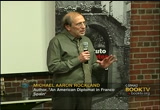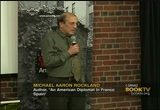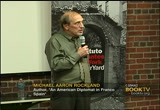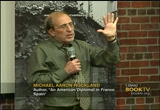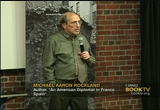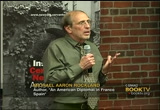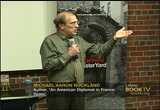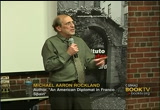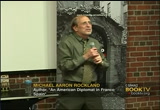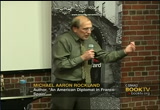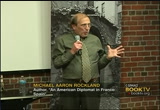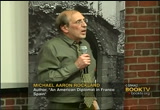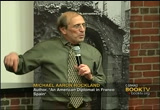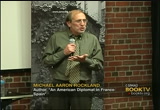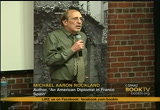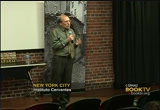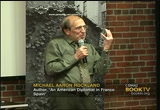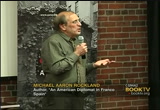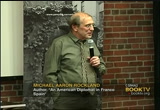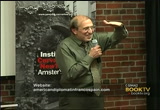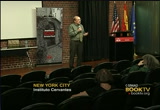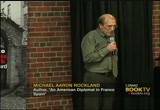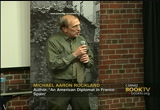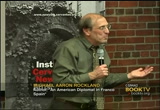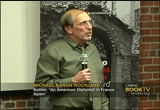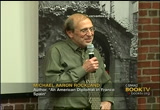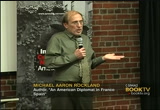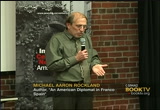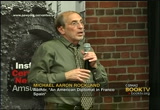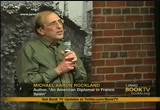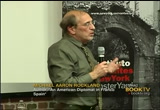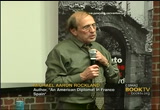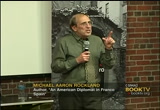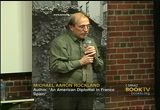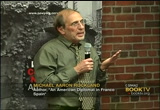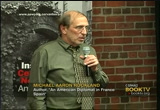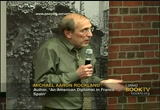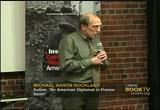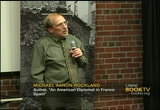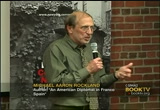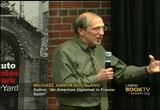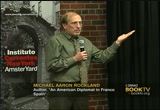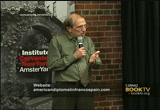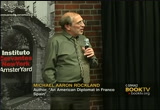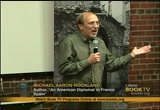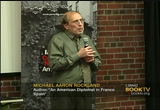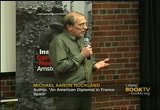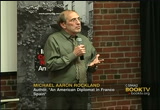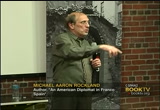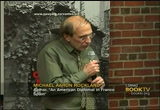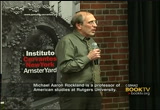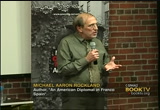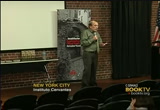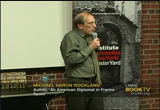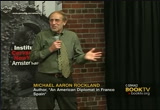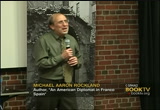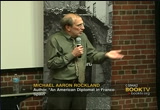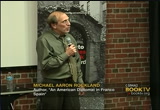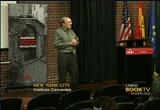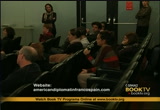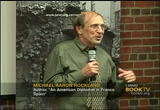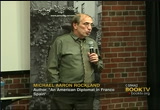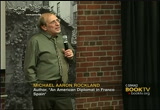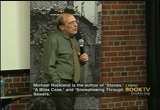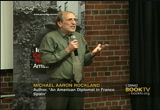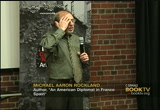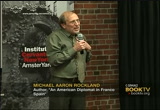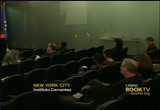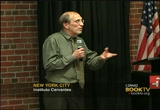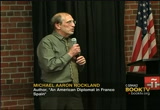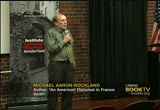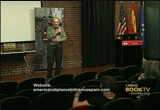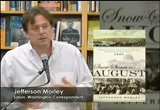tv Book TV CSPAN December 30, 2012 7:30pm-9:00pm EST
7:30 pm
>> next comment michael rockland tax that experiences as a cultural attaché at the u.s. embassy in madrid during the 1960s. this is about an hour and a half. [applause] >> i thought i'd begin by telling you how this book came about. i am on a train from valencia to barcelona, just a few years ago. and it turns at the woman sitting next to me is not only professor at the university of valencia, but the head of their press. she said, and there's the end you're at the embassy. i said yeah. i thought to tell her some stories as she said, would you read the book for us? i said sure. it is the fastest contract ever gotten my life.
7:31 pm
and i'll pass it around. that's this copy of the book, the spanish version and also pass around the american version they are somewhat different. either way, my publisher, john hansen who is right. and his wife, judy is on the air. here in the united states they do wonderful things. they do wonderful, creative publishing, especially in a world where nobody reads anymore were very few do, so you do so i'm glad you're here tonight. so after it came out in spain, and spanish at university of valencia, nauseous come out october 1st year in the state. and it changes the bunches of.
7:32 pm
a lot of the stuff i changed was john's idea. he said he was absolutely right. he said the ship to hear you don't think understand and he also made some wonderful suggestions. so we took a chapter out and instead put in an afterword, what it was like to get out of the diplomatic service and go to rutgers university where it been every since as a professor in the very late 60s, early 70s. i went there in 69 and i'm still there. i was supposed to go to vietnam as a u.s. cultural attaché in spain and by this time i thought the worst these idea and i'll say three little children i wasn't going to be in a non-gory
7:33 pm
work i didn't believe in, so i left the service. the four years before that bernstein. there's probably two stories they want to focus on this evening. one is about the day i spent along with martin as their king and richard of all places and the other run is about one of the really terrible events of the cold war, which is than the united states ended a dropping four hydrogen bombs on spain, luckily unarmed and not on purpose and not say that story later. two very different stories. the king story is a sad story in the bomb story is that her story. before he do that, i'd better tell you about the other chapters in the book. and by the way, i brought along
7:34 pm
a bunch of copies and if any of you want one, i'll write anything you like in their. kazan always looking for readers. that's what you write books. this is my 13th book. i write fiction, nonfiction, journalists and peered at go back forth. i never wanted to make my mind up of who i wanted to be when i grew up and i never have come to circle back and forth between different literary forms. a couple of chapters in the book i might mention it will get to martin luther king story. one of the chapters is about the making of the movie dr. chicago. my son who is then four and a half is the little boy in the movie. omar sharif says mother in a sea picture book is this coming around both in spanish and american edition about how that
7:35 pm
came about. it was very strange and wonderful it very in. and there's another chapter in their on what it was like to be a in spain in those days when given the concordat between franco and the vatican, which made every other religion illegal. if we cannot shot her with a funny story really. what's not funny as i'm in a bar in northern spain and the guys in the bar are trying to teach me how to pour the wonderful seder, though harry seder of the story, which perhaps you know it. you will compile the say over your head and you have a class
7:36 pm
with a very big open by spring up this way and decided associate the outside of the class and balancing. i'm trying to do that, but most of it is running down my pants world over the floor. a little bit is going into the class. one of the guys says to me, immoral party was drunk by this time it one of the case estimate, are you catholic or atheist clerics does seem to be the only possibilities. so i said i'm neither a catholic or an atheist. he said no kidding can best be protestant. i said what he think that? because of her in the her in the american government is protestant. he said that's. john kennedy was a protestant.
7:37 pm
so he said what are you? i'm jewish. they said no, you couldn't be jewish. why couldn't i be jewish? because you don't have an abhorrence. i choked. i said i have been cut off when i came into the foreign service. but i said it jokingly and he took it seriously. there's a picture in the book, which is in the american book thanks to john, not in the american book of michelangelo's moses, where he shows moses with horns and a famous translation of the bible, where it says torrents of light came down on mrs. firm had been. but the mistranslation, so michelangelo gave moses horns and that's where the story apparently came from.
7:38 pm
i did not horns. it couldn't possibly be jewish. there's a chap during their called lost in translation, which i like a lot because i look at what's up singing in the united states and whitsitt seen in spanish. very different things. things that are set in spain every day, which fantasy than in the united states, i'd be beaten to death by all the women 50 miles around. and spaniards say it every other word. from there it ends the other way around that we say the spaniards would never say and you get a real sense and feeling for how the language is such an index culture. and also i think what he should teach all of us is when you translate come you have to know not just both languages, but both cultures, you really do.
7:39 pm
i translated one book from spanish into english and i really have to know argentina for the book because i was that our embassy in argentina before spain. i had to have a sense of the feeling in 19 century argentina the list to do that. pusey expressionist spanish [speaking in spanish] which means little translation. so there's a perfect example. a few thoughts [speaking in spanish] translation, you wouldn't see how a translation english release anything. he was a little translation. a perfect example of how you have to know both cultures to do that kind of thing. one other thing it did find the stories come in the first to
7:40 pm
respond how i managed not to shake hands with francisco franco. in those days, spain had lots of fascists around, not just the government, but this was fascists and even in exile living in madrid. my next-door neighbor was a romanian not see. we didn't speak for four years. but also there are lots of people living in madrid to ban who loved spanish culture as i do at one point in a book i called this took a love love letter to spain, and it is. but in addition -- i would see one domingo peron walking around
7:41 pm
in my neighborhood all the time. receive florencio but these walking around, but when i would see real nazis, that was something else. i went to a party. i was invited by akai in the spanish government to go to a party at his place, a big apartment and since he the guy worked with and cultural affairs, i went to the party can do what the door and immediately spotted two people come i couldn't believe it. i'm one of those around us able gardener who lived in spain and most days and on the other end of the room was our scores gainey, the guy hitler called his favorite soldier. he was the leader of the attack
7:42 pm
on this mountaintop with goliath, the partisans in italy had captured miscellanea more sure what to do with him in 43 and scores gainey in the middle of the night, and these craters within a flat place on top of the mountain we could comment silently and then they kill the partisans can put back into power. he standing on the other end of the room and somehow the contrast straight out of freud. i wasn't going to go down where he was because i would've been there five minutes and it probably would punched him. so i thought especially since i was aghast at the sky sky from the spanish government had down to a vet who's been in their train came and just barely standing up. i mean, she was an alcoholic
7:43 pm
come in basically drink to death and she was standing there. i said ms. gartner, just wanted to tell you how much i've enjoyed your movies over the years and she said, young man, you speak english beautifully for a spaniard. i said that's because i'm at a spaniard, but by that time she had drifted away. i don't think she even heard my answer. she was really gone. so that's typical of that chapter. just one other thing in the chapter and then i want to tell the king story and the mom story. the ambassador who's here by in the diplomatic service receive an invitation to the national
7:44 pm
spanish art show, which at least banned use a tape place in the central part of madrid, basically behind the prado museum and there's a crystal palace there and they have this art show. the ambassador passed it all the way down and then they said there is nobody i could give it to. i was the end of the line, so i went. although it is very much looking forward to going because it's a cultural attaché, your friends, the people you want to appreciate american culture and what you do are the artists and writers and musicians, the most cultured spaniards and professors and students. those are the people you're really trying to convince that
7:45 pm
the united states is in a totally barbaric country. so i went and everybody that was there as far as i can see are all ambassadors. size to a pretty good about myself. i was in my 20s. the analysis and ambassador. make a late ambassador here representing the united states at this event and this waiter is coming around with wonderful hors d'oeuvres in lovely wine and so were all pretending to look at the pictures. the first thing i noticed is not of my artist friends were there. the pictures were look at the wall, but none of them repaired. i was looking forward to seeing them and they weren't there. they must have known something i didn't know because after we were standing around, suddenly send chief of protocol asks everybody, all the diplomats to line up in a line. so i lined up and write here is
7:46 pm
the ambassador from guatemala and ratio is the investor from an african country, which at ever heard of until that point. and we are standing there in everything. i looked in batman, here comes franco. i have no idea, surrounded by general somewhat not. there's franco coming along. given that i was the most senior guy in the hall and they see, you know, i would never be in this position. and he is coming along and he is creating each diplomat they are from their country and having a two minute conversation with them and then moving on. i thought i just can't do this. i'm just not going to shake hands. i'm just not going to do it. even though it was my duty to do it. talk about damnedest to do, if you don't.
7:47 pm
what can i do? feminist line. if he gets to make and six at his hand, i guess i have to shake it, but it's something i'll be ashamed of for the rest of my life. and then i realized right behind me is a portable wall, kind of the screen, a big wall coming in now, a stand of panels. i cannot describe it in english or spanish, with some pictures on it. another is, in addition to the pictures on the come in. these pictures on the panels. and i thought, wow, can you really do this? so what i did is they asserted that up away from the bottom all in an african guy and just simply went behind the panel, very afraid that maybe somebody from the spanish government had
7:48 pm
seen me for that word would get back to the embassy and i'd be on the first plane out by morning if not earlier. i was very afraid, but nobody saw me. neither the spanish government, nobody from the spanish government noticed a nobody reported to the embassy, said the next day i watched until franco went by and then i came out of ken and cruised back into the line. it was a great moment, which i enjoyed very, very much. so that gives you a sense of what's in this book in general and how i like to focus on the two stories. and by the way, i will take any kind of questions that you'd like to ask me later on and they can be in spanish, too if you
7:49 pm
prefer. okay, the martin luther king story. i had happened to mention to the ambassador that i've written my m.a. thesis, my masters thesis on a montgomery bus boycott which first brought martin turow's attention. we all remember that event. and this is why what happened happened because i forget the context, but i'd mention this to him. so that morning, and sitting there and i am reading and like the other spanish newspapers, they tend to be published in tablet form. and on the cover is a picture of martin luther king that the pope paul the sixth. and i'm reading and it says that
7:50 pm
it's her married the king is coming to maturity today. it's that day's paper in the pictures taken the the day before. after a while. and then the phone rang. this is ambassador woodward. what did i do now? is what i'm thinking because the ambassador doesn't call you on the phone. the ambassador told somebody to so somebody else to call you on the phone. so i get a call from the president of the united states in that context and he tells me that martin luther king is coming to madrid and he said, how would you like to handle the project? and i said mr. ambassador, i give my left arm to be with him. he said you look after him. if you need anything else, i
7:51 pm
have to be an all-day meeting at the foreign ministry. i'd like to see in myself, but i can. so you look after him. he need anything, call my secretary. you can have filled them out when you you command a chauffeur, want, but he's basically coming here for r&r. he's just coming here for a day of rest. he's never been in spain. he's coming here to be a tourist for one day and tomorrow is going to amsterdam, where he is going to keynote an international baptist convention or congress or whatever of some sort. i said well okay. the ambassador gives me his plate number. so i call the airport in this flight had already landed. i'm supposed to be looking after him. i don't have the foggiest notion where he could eat.
7:52 pm
there's 500 hotels in madrid and i don't even know she's staying in a hotel. even if i call 500 for most people help me, i don't even know. he might be staying with friends or something. i have no idea. i'm really scared because i screwed the thing up already, even though it wasn't my fault. by the time the ambassador called me, the plane had landed. so, i started to call hotels and i don't know why i didn't call this particular hotel first. it is a hotel closest to the embassy. the embassy on trends unfair on us treat and behind it is the main drag in madrid and on the other side is that helped him.
7:53 pm
it's the same building. i should have called them first. i had this ridiculous conversation with the desk clerk. it was really funny. i said is there a dr. king stan at the hotel? in spanish. this guy wants to try his english out on me. mrs. king, how do you say that in spanish? he said [speaking in spanish] one time we had a duke, but we've never had a cane. i said no, his name is king. he said dr. king. just look at the register. i have 480 more hotels to call
7:54 pm
may be. he looks at the register and he says keene here. he had to put on there somehow. it's better in spanish. all good in spanish. [speaking in spanish] is so funny that in spanish you say a black unquote. it was so funny is in the root to you in that context. with the last words were in and out of the door at the embassy around the corner down to the casiano, unpromising which i should know it's like crossing the new jersey turnpike, which
7:55 pm
is one of my other books, on the new jersey turnpike. it may be a native new yorker. i'm dodging traffic like crazy and make it over to the hotel and pick up the phone in the lobby and i say which you connect me with his room? somebody picks up the phone and says hello? i had woken him up. he was exhausted and he'd gotten there and going to take in a period he had gone to sleep and he probably hadn't been sleeping more than 15 or 20 minutes in the phone rang and it was made. so i said dr. king. he said yeah? i said this is michael rockland. i'm the assistant attaché in the ambassador asked me to come in knowing that you were coming here ever having a free day and perhaps they i can help you decide what the media is spain
7:56 pm
is looking for you and it's a clinic on june 1st because they had to make some decisions about what to do at the media, whereupon he says i'm sorry, i don't speak spanish. i said this is not spanish. this is english. the poor guy gets off the plane. he's got a little piece of paper, gives it to the cab driver and here's this new yorker with my accent talking a mile a minute, i had woken up. it is not understanding what i'm saying, so he, so he figures they must be speaking spanish. so i repeated it, slowly and he said sure, come on up. so i went up to his room and knocked on the door and he opened the door in his
7:57 pm
underpants. it's like many george washington and his underpants or abraham lincoln. at least for my students at rutgers university where you teach because for them, martin luther king is ruling the past, back there with washington or lincoln. all of american history before they were born is ancient history to them. but in any case, here he was in his white boxer shorts. i go in and we americans are informal. he'd been taking a nap, i understood this perfectly. and i began to talk to him, look, we've got to do something about the media because they found shoe. i found your comments are going to find you. and if what you want to do is take it easy today, i want to help you take easy today. and here's what i recommend. i recommend that the press attaché at the embassy set up a
7:58 pm
press conference at half-an-hour in the ballroom at the hotel, limit it to a half-an-hour. i'll do the interpreting and help set it up for an hour from now. i said though, i understand you're tired and you're just here to see the town really, but if we don't do that, they're going to be following us out of the town. the paparazzi would drive us crazy. but we don't do this since they disseminate to that. so he says okay. so i called over to the embassy and a set it up in later on it was really funny to be in his room when i put on the television when he was in the shower and was kind of funny, watching the preparation of the press conference downstairs in the same hotel, which is on the television set. kind of cool.
7:59 pm
i asked him, do you have any immediate problems that could solve? i have one, but i'm kind of embarrassed to talk about it. i said will look, girl just people and if there's something i can do to help you. so we said i've got a terrible case of. the closest thing we have in america to an american say. in a very, very great man. and he gets diarhea. he's a human being. it is typical of the whole day to be with king and is just a guy, invited me to mentally to call him martin. so it's martin and michael hanging out in madrid and i was
8:00 pm
then 29 and he was 35, so he wasn't that much much older than me really. but he was murdered he was only 39, four years later. so i said, i'll take care of it. i'll be back in five minutes. in those days and probably so you can get thinks over-the-counter in spain that she made a talk or to subscribe here in the states. ..
8:01 pm
8:02 pm
would be doing a very kind act, and i won't let him stay more than a minute." he says, okay. the minister goes upstairs and sees king standing in the small room in the underparticipants. as i had. he's still in the underpants. the minister, of course, being spanish, he hesitated for a moment because martin luther king is in his underpants, and he rushes across the room giving martin a giant abrasso, and -- which martin never experienced before. i'll never forget the look. he's looking at me over the minister's shoulder, the look of, hey, man, what have you gotten me into now? what's this? what is it with this minister guy?
8:03 pm
this sinister minister? then he went, took a shower, and then got dressed. we went downstairs into the press conference, and the press conference, a bunch of questions, like, dr. king, how do you like spain? in spanish, and then i said martin luther, how do you like spain? i don't know anything about it. i just came off the plane and went to the hotel. all i've seen is the taxi and hotel room. i said, don't worry, i'll take care of it. dr. king really enjoys spain and admires the spanish people, and we had a series of questions like that in which he could not possibly have an answer. each time i asked, he said, i don't know what to say, don't worry, i'll take care of it. i just made the stuff up, you
8:04 pm
know? i guess that's called diplomacy, i don't know. and then we went upstairs, and i said, look, why don't you take a nap now. take a quick nap. i'll pick you up, and then we'll go to lunch. that's what we did. meanwhile, i got the embassy chauffeur, the limo, and any of you who know madrid know boteens restaurant just off the plaza mior down the steps, and it is the same restaurant where hemmingway's "the sun also rises," ends, the last scene of "the sun also rises" is in that restaurant. that's where we had lunch, down in the bodego, down way below the street, and if you know it, it's cave-like down there. i'll never forget there was an
8:05 pm
american couple sitting over there, and she says, "i think that's martin luther king." he looks over, no, it looks like him, but it's not him. i was not going to disabuse them of this. then we went shopping. he wanted to buy stuff, gifts for his wife and children. i took them to the place we knew, and tried to steer him to the good stuff, but he, like any other tourist,mented the flamingos and the bullfighters and the bullfight posters with his son's name on it. his son would get a poster with his name in there instead of the great bullfighter of that time.
8:06 pm
you know, i understand perfectly, in madrid for the first time, that's what you get, but i was trying to steer, like, come over here, there's good stuff. had no interest in that. then we put all of the gifts into the car, and i told the embassy chauffeur to go back to the car, bring the gifts to his room, and we went walking and spent most of the afternoon just hanging out in the park. we stopped a couple times to have coffees, and it was really wonderful because we talked about everything except the nobel prize which he was awarded two weeks later. we talked about our families. we talked about our lives. it was a very beautiful and
8:07 pm
wonderful experience for me. you can imagine it. we talked about black history which was a foreign concept to me at that time. just like women's history or gay history or anything else like that, you know? we realized the history that many of us study was called white anglo saxon male heterosexual history, the puritans, all of those guys, and it was just a very warm and lovely, lovely time. there was one thing about him that i wanted to report, which i think is kind of -- you wouldn't expect this, but just as einstein, they say was lousy in math in elementary school, martin luther king, who i think was a genius at what he did, yet
8:08 pm
very human in the sense that with the possible exception of my wife, i've never met anybody who is geographically so out to lunch. we had the crazy conversation. i thought he was putting me on. he said, michael, we're in madrid now; right? yeah. where is madrid? the peninsula, portugal here, and madrid in the middle of it here. okay. so from here, where's rome? i thought, a little bit of france, through the italian boot and rome there. rome is basically due east of here. i think is he putting me on or what? tomorrow i'm going to amsterdam, so where's that from here? i sketch in on a napkin.
8:09 pm
i wish i saved the napkin. i sketch on a napkin northern europe more or less, and i say, he's amsterdam. it's basically northeast of here. then he asked me -- i just couldn't believe it -- the last question was, and, okay, and so from madrid, where's the united states? i thought -- i looked at him, and i said you got to be putting me on, pulling my leg, this is not real. he meant it. i drew sort of like maine and florida, and, you know, to the west there, and then i put waves. he was in spain. this is spain, and the united states, and it was just -- it was just so strange. here was a man who was
8:10 pm
unbelievably intelligent and, as i say, in what he did, not only a very great man, but a man of genius, really. i don't know if we've ever had a greater speech than the "i have a dream speech" in our entire history for one thing, but a man who made it possible for us to be prouder of ourselves as americans today than it would have had he ever lived. in all kinds of ways. then we went and had supper. we had supper in -- in one of those -- the ham museums. the restaurants for those of you who don't know them. they are all over madrid, and there was one there down towards
8:11 pm
not too far from the park, and so we sat at the counter, and we had a ham and cheese sandwich, and then he said let's walk back to the hotel which was about two miles, two or three mile, and we did. we walked back there. it was getting to be nine or ten o'clock at night. i said i'd pick him up in the morning to go to the airport, which i did. this time, i knew, and i had the ambassador's limo, the chauffeur, the whole bit, and we got out at the airport, and he did something which was very curious, you know, i'll always remember this because it was with the minister had done with him, and that is just before he went to the plane, he turned around, put his suitcase down,
8:12 pm
and he threw his arms around me and gave me an abrasso, and i can still it still to this day, just a wonderful, wonderful moment. the other story i want to tell you is a grim story in many ways. what's the most difficult part of the story is that we in the embassy new nothing about it. didn't know i knew nothing, but turns out the ambassador didn't know anything about it, and if we believe in civilian control of the military, this is a heavy thing. here's what happened. it was january 17, 1966, and i had just supervised the creation of a new american culture center, not too far -- on the
8:13 pm
other side, just a block down from the hillton hotel where we met mark, and i -- so we had created -- we brought up this big old palace in aristocratic spanish family had owned, and we turned it into a culture cement e and i hoped to be the director of it, but i was the most junior guy, and then a new guy came, and he was above me, and we had a culture -- he was not going to do it, and we had three assistants, and i was the most junior of them, but this guy came, and because he was high ranking, he was not begin the title, but deputy, and he was deputy and two assistants. i was one of the assistants and announced he was the director of
8:14 pm
the americana in madrid. i was sad. i was sitting at the desk on january 17th, 1966 and the following happened: united states, we were to learn later, nothing top secret about this, it was top secret, but it isn't, and it's in the book. in the american version of the book, i didn't have it in the spanish version of the book. we used to send squadrons of three b-52s every six hours towards the borders of the soviet union. every six hours a new squadron took off flying in circles around by the soviet border. there was a movie called "fail safe" based on a novel called "fail safe," and there's also dr. strangelove. stanley's brilliant and funny.
8:15 pm
i saw the movie and read it. i didn't know i was about to be in it, and these three planes in a squadron, each carried four hydro jen bomb. each hydro jen bomb was 75 times more powerful than dropped on hiroshima that ended world war ii. you add the four together, there's 3 # 00 times more powerful. each, four hydrogen bombs, and on the way to the soviet union, though we didn't need gas that much, the tankers from the american bases that we had, and we still have, i believe, the
8:16 pm
nuclear submarine base, which is near catty, but the air base was turnedded back over to the spanish government, and this is, by the way, one of the reasons why most of the people in the baa sigh, their -- embassy, their job was to be cozy with the spanish government. i was one of the few people, else when you see where i go to in the story, where i was outside of the embassy, but before that, i was -- one of the jobs was the liaison at the spanish university giving talks on mark twain, jazz, and stuff like that at various spanish universities, but the embassy was cozy with the government because they wanted the bases there. this was the cold war, and it was very cold at that time, and the cuban missile crisis too.
8:17 pm
these bases were important to the united states government, and when i first got to spain, as a matter of fact, we had b-49s on the bases outside of madrid, next to the airport, and it was there, and another near, and there was a little one near there as well, and we had the b-49s there, and so in the middle of the time i was in spain, we brought in the b-52s that came online, and the b-49s retired, and the b-52s had a much longer range, and so we didn't have to keep them on the
8:18 pm
soil. these are the planes or the bombs, and the schwa -- squadrons took off from bases in the eastern united states, and when it got to the coast of spain, a -- three tankers would meet the planes, and each one would top off the tank, the fuel tank of the b-52s, and it would then -- it didn't need much gas then, but it wop #* -- it wanted them full as possible to go to the border and fly in circles for lunch hour. just never crossing the border, but as you remember, and, by the way, what they were doing was calledded fail safe. still in the novel, i think it was 62, talked about fail safe, whoever wrote it knew what he was talking about. i thought it was something he
8:19 pm
made up. that's what the air force called it. it was the fail safe position. the planes would fly around in circles, and when the next squadron which took off six hours later approached topping offer their tanks on the coast of spain and the next squadron approached, the next one broke off contact, turned around, and headed back home. now the the refilling was much more important because they really didn't have much fuel at all, and now the tankers would meet them and top off their tanks so they could land back into the united states. this is going on 24/7/365 this is going on all the time.
8:20 pm
january at ten in the morning, a squadron on the way back, one of the b-52s came up too close and crashed into the kc135. made contact. the kc135, was which is a flying gas tank, blew up. everybody on kc135 was insin rated, and of the eight guys on the b-52, four killed, four ejected, and came down. three of them in the mediterranean. one of them on the town. the key thing was the four hydrogen bombs which were ejected and came down by parachute, okay? in the case of two of those bombs, the parachutes were badly burned, and they came down too
8:21 pm
fast. these bombs, i should merely tell you were unarmed meaning that -- the pictures in the book of one of the bombs is, in fact, there's a museum in new mexico i'm told, i think i mention it in the book, i forget, where they have one of these bombs. something about the museum of the nuclear age or something like that in new mexico where they have one of these. obviously, everything out of it, it's just the outside. the four bombs came down with their parachutes. one of them we couldn't find for several months. there was a spanish fisherman francisco port, probably from, i think he came from the next down
8:22 pm
down, a fishermen's town. the town grew tomatoes. that's basically what they did. this guy, paco, called him paco the bomb guy, he kept saying i know exactly where the fourth bomb is. the u.s. navy didn't listen to him. they had 20 ships there by this time. they were checking the bottom of 120 square miles of the mediterranean. ten by 12 miles, and they couldn't locate the bomb. he said, i know exactly where it is. they didn't want to listen to him. what does he know? a guy who goes out fishing every day knows exactly where he is like you know you are sitting in your seat, and i know i'm standing up here.
8:23 pm
he knew exactly where that bomb came down. no one listened to him until later. meanwhile, we got a much bigger problem as it turned out. two of the bombs, as i said, their parachutes were badly singed or burned. they came down too fast. one of them came down just fine, but all three of them came down on a little town, 250 families. agricultural in the prosince of el maria, and they grow tomatoes, and, by the way, this sounds familiar because the town is back in the news lately. i'll tell you about that in a minute. one bomb came down just fine. came down slowly, settled down, but two of the bombs, the parachutes so badly burned, they
8:24 pm
came down fast, and apparently, the nuclear devices carried also conventional explosives where if the bomb was armed, the conventional explows eve would set off the nuclear fusion or whatever it is. by saying the bombs were not armed means this, that the bombs would always be in an unarmed stature means that you would have to -- two airmen together would have to do about seven or eight things for the bombs, push this in, pull that out, push this button, i don't know, do a lot of stuff to it. that could only be done under the direct orders of the president of the united states, and in the movie "fail safe," if you saw it, you may recall that the wrong signal gets the plane to go bomb moscow, and then the
8:25 pm
president's wife, who is clearly kennedy and jackie is shopping in new york, and the president has to agree with the russians that he will send up a -- a bomber which will bomb new york city if the american plane reaches moscow, which it does. he will drop a hydro jen bomb on new york city. that's what happens in the novel. anyway, and, by the way, we're all familiar with the president walking around. i don't know if it's still the case in the missile age walking around always with an airman with him with a black bag, like a doctor's bag, and there are the codes. the codes are changed every day how to arm the bombs on a particular day. these two bombs came down, and the conventional explosions went
8:26 pm
off, just went off. miraclously didn't hurt anybody, but split the bomb open means that the plutonium, the most deadliest substance that we can imagine, all came out. the bomb split open and it all came out, just a little black cloud. miraclously, normally when you're at the seaside, the wind blows off from the sea. for some reason, that day the wind blew off the land. most of the plutonium was blown out into the med -- mediterranean, not necessarily a great thing either, but better than landing on these poor people in the town. some of the plutonium is spread
8:27 pm
all around so the people from the town left. they made them go through a chamber where they washed them down with anti-radiation stuff. they went into that chamber leaving their clothes behind, their possessions, everything, just their bodies came out the other side of the chamber. for many, many years, at least 25 that i know of, the people from the town were given urineanalysis to see if they were infected by the radiation. what the u.s. then did was basically go in there and -- with the guidance counselors saying we're picking up radiation, and they went in there, and they wore all kind of special anti-radiation suits, went in there, and they bulldozed the entire town.
8:28 pm
they -- all the houses, everything in the houses, and three feet down, tomatoes and three feet below the tomatoes, was all bulldozed and puferlized in terms of the houses, and all of that stuff was put into thousands and thousands of barrels, special barrels made in italy and brought there for that occasion. figure i have a 5500 barrels, and they were loaded aboard ships, and if you ever want to visit the original town, you have to go to south carolina because -- because they went up the savannah river which separates southern south carolina from georgia, and up the river, there was a quarry,
8:29 pm
put them into the quarry, and then they, quote, sealed it up. i put "seal it up" in quotes because it's the half-life of 250,000 years so i don't believe it's sealed up. at some point, it's going to give way if it has not been leaking already. where's the fourth bomb? timely, they are desperate. the navy is desperate, and so they go out with paco, and he goes out in the boat. they send a destroyer out there with him. it's right here. bomb's right down here. of course, that's exactly where it was, the fourth bomb.
8:30 pm
it was crazy they didn't listen to him in the beginning. twenty ships, and this guy says he knows where it is. they didn't listen to him. absolutely nuts. now how do you get it up? it's down about 3,000 feet. by the way, there's a movie with robert de niro and cuba gooden, jr. which cuba gooding jr.ments to be a diver. it shows him walking along on the bottom of the sea, and he comes across the bomb. you can't go to that -- in any kind of a diving studio, you know, you'll die. that's what they show. they show him finding the bomb in "man of honor," and apparently the movie's based on a real guy, but that part is not real.
8:31 pm
the town comes up briefly in the movie. speaking of movies, they were going to make a movie called muchos gracious mr. ophenheimer." he was the making of the bomb. it was a romantic movie. an american airman meets a spanish girl, and the bomb brought them together. that was going to be a movie. i don't think they were going to make it especially when i tell you the very end of this little story. it then -- but before we got the fourth bomb, the spaniards are very concerned about whether -- the tourists are going to come down to el maria, down to the
8:32 pm
province which has a lot of tourists, a lot of beaches. this is a world story. by the way, the soviets sent a spy ship. it was sort of right there with the 20 american ships, and the soviets, of course, were putting out information saying we dropped bombs on spain on purpose. i mean, the story's bad enough. we didn't do it on purpose. by the way, the afternoon of that first day, the ambassador called the meeting of everybody in the embassy and said, did any of you know anything about this? absolute silence in the room. what was more disturbing is he didn't know anything about it. if nobody knows anything about it, then -- but the ambassador does, okay. he didn't know anything either. i forget the general's name on the phone, the strategic air
8:33 pm
commander in omaha, and they got this guy, and the bam -- ambassador put it on speakerphone, and it was something. i never heard the ambassador speak that way. i mean, but he was saying, using a lot of profanity, how come i didn't know about this? general says, well, it's top secret. nothing's supposed to be top secret from the ambassador, but the president. you don't have top secret with the ambassador. well, i can't answer that question, mr. ambassador. the ambassador was furious. so it became advisable to try to prove that everything was hunky dory down there, and much of the embassy was down there. we had a skeleton crew running
8:34 pm
the embassy embassy, and the am, and most of the top people, the top brass of the embassy were down there because this is the center of the world at this moment. it was the biggest story for months. i wish i could get there, and i got the opportunity. a briefcase came in from the white house, from president johnson full of papers. we didn't have any cure yours handy. we drove through the night, and i sat in the back with my best suit on with this briefcase chained to my wrist, and kept chafing my wrist, and i kept
8:35 pm
trying to make, you know, put it on something where it was not pulling on my wrist, and i got down to the town in the morning, and nobody was there except helicopters flying over, all of the cows and goats going out of their mind. they are running around like crazy, the cows and goats just byzirk because of the helicopters, and the people of the town didn't know what to do with themselves, and i said where's the american ambassador. oh, he's down the coast. the nexting town with the fishing town, the next one. the town had a government hotel on the beach, and that's where the ambassador and the embassy was staying. i said to the chauffeur, let's go there.
quote
8:36 pm
it's five, six, seven miles down the coast. we p went there. just as i got there, the ambassador came striding out of the hotel wearing
8:37 pm
ambassador, our ambassador and the minister of information and tourism who just died awhile ago.
8:38 pm
people, and maybe i better go too because, you know, it would be bad for the career. i better do it too. i got the best tie, shirt, best everything, but let this be a lesson to you, never wear underwear with holes in it. if everybody's going, i better go to do that. i'm laying out on the sand, and the tie, the underparticipants, unlike martin luter king's had holes in them i then ran intoed mediterranean, we're splashing around, and we came out, and the hotel is terribly nice. they had a chamber maids there with towels for everybody, great big fluffy towels. i needed two, one to put around
8:39 pm
my underpants and the other one to dry off with. there were waiters on the beach with little trays with cognac and appetizers a we're having a party in the morning on the beach in spain. i was not there for the afternoon swim when -- and this was in the town itself where frogger and duke, the american ambassador went into the water this time, second swim because i had to get back to the embassy, and i was doing, like, three or four jobs at the same time for other people, or faking it anyway. so i left.
8:40 pm
then the wonderful thing happened. the only one who got anything out of the bombs was me, this miserable thing because they needed everybody possible to be working on pr, and a thousand other things that was constant, you know, liaison with the navy and spanish air force and just incredible stuff. i became director of the continent americana, and i -- now i had my own shop, my own staff, had my own secretary and assistant and staff, and i mean, culture, who cared about culture, the world nearly disappeared. who cared about culture. let rockland take care of culture.
8:41 pm
the incarceration, where ambassador duke was shaking hands with somebody, and i'm in the pictures. that was our inauguration of the casa. they still hadn't pulled up the fourth bomb yet, by the way, when he inaugurated him, but i think we didn't --mented to open it because it's a way to show, hey, look, we know there's still a missing bomb, but we're culture people, opening up a cultural center here, and frogger and duke also both came to the opening of the casa americana because frogger wanted to identify himself with something culture too. we had the inauguration. i'm the only one who, i think, benefited, if you will, from this miserable, horrible story. when i said before the story has
8:42 pm
not fully gone away, perhaps you've seen in the papers recently there's discoveredded a hot -- discovered a hot spot in the town that was not properly remediated. apparently, this was a low area. i don't know if it was something that was sloppy or stupid or what, but they threw a lot of dirt into the low area, but they didn't dig down in the low area, and so there was plutonium down there, all of these years. when they discovered that, they put a fence around it so people won't go in there, but the animals have been going in and out forever, and for the people, they just walked over that like they walked to any other place so this will be remediated.
8:43 pm
i don't believe it. i read in the paper that the united states and spain having discussions about who to remediate this. seems to me, what's the problem here exactly? we did it. let's remediate it. in fact, hillary clinton made a statement about this recently saying we will do it. we'll negotiate, but we'll do it. i don't know what to negotiate about, maybe how to do it so the story is back in the news and because it's back in the news, i don't believe that one of two things, either of two things are gong to happen. i don't think they will make that movie because here we are 40 years later, and it's still arrive, this miserable story. the mayor of the town wanted to have a theme park -- he wanted to build a theme park in the town figuring it would be
8:44 pm
tremendous tourism coming to the town with no hotels or anything like that, it's just a farming town. he wanted to build a theme park, and i don't think the theme park's going to be built either. certainly, nothing is going to happen with regard to the movie or a theme park until we've cleaned up this one spot which was not cleaned up back then. we'll have to see after that if someone still wants to make a movie or still wants to have a theme park there. i kind of doubt it, but who knows. now, that's my presentation. i'll be happy to have any questions from anybody about anything, anything you would like to ask. oh good, good, yeah because -- by the way, this is being filmed by c-span, and it's going to be
8:45 pm
on television so ask me some good questions, will ya? we'll get you on in the program that's being filmed all this time. no questions at all? oh, we got one, good, good, thanks. >> hello, i'm andrea. can i ask in spanish version? >> yeah, sure, sure, i'll translate it for c-span, assuming i understand it. >> okay. [speaking in native tongue] >> yeah, so the question was how did i begin -- this is for c
8:46 pm
span, i don't know -- how did i begin as a writer. well, my first book was my doctoral dissertation that i wrote during the seven years i was in the foreign service. it was probably the about the most important figure in arian gene teen -- argentina's history, and i was there seven months ago lecturing about it and other things. my doctoral dissertation and the united states, ambassador of the united states, president of argentina, but he wrote a lot of books on the united states. in fact, the one book i translated from spanish to english was one of his books on the united states. the first book was really the doctoral dissertation which i was really in princeton then,
8:47 pm
and then in morristown, and then it took it to princeton university precedes, -- press, and they really liked the book, giving me a shot in the arm making me feel more confident. it seems as if i've become more productive as i've gotten older which is keep of nice because usually you think, you know, you -- when you are younger, you're more productive, but seems me productivity increased with age which is a nice thing so the spanish book, the book on spain is my 13th book. only two of the books are novels. in fact, the second novel was also published by hanson publishing, john and jodi,
8:48 pm
called "stones." a lot of people say what's it like to go back and forth between journalism, scholarship, and fiction? i say, well, it helps if you are scrits phrenic. well, i'm not scrits -- schizophrenic, but it's welcome like that. always feel that -- fiction's the hardest for me, by the way, for me, i don't mean it's the hardest, but it's the hardest for me. once you wrote a dissertation, you're ruined for life in terms of being able to communicate with normal human beings. i say, you know what i'm talking about. the fiction came along quite a bit later, and, first, i did scholarship, and i moved more and more into books that were more jr. a general audience.
8:49 pm
i also do write for magazines from time to time as well. i've been involved in film making, some also, one of the chapters in the book, you may have noticed, i mentioned it before, it's a chapter on the making of the doctor, and i was with my son at four and a half, just this little boy, my first experience with film making, and more recently, a strene movie with my house as a set, 12 years ago, called "one true thing,," and we had to move out. my family and i had to move out for six months; then there was another movie made for television in which a phren and i wrote the -- friend and i wrote the script, and the guy got a grant. there was not much money so we were asked to play the two parts in the movie. i've acted in one movie. it's a story of two crazy
8:50 pm
professors from rutgers university who start out in little creeks in central new jersey and go into bigger creeks and bigger, and eventually, they are in the ocean and coming up to the new york harbor, and the last scene takes place in the ruins of ellis island and then manhattan. it's a scripted film, and i can do a pretty good imitation of myself. my friend and i actually made that trip, and then a filmmaker was interested in making the film, and he asked us to play ourselves. i guess we could do that. it's not a documentary. it's a scripted film. he wrote the script and then played the part so i guess i like the variety of doing different kinds of things. when i -- the book i'm writing now is a memoir as well.
8:51 pm
it's a memoir of my two years in the u.s. navy. i was drafted right out of the college, and i -- they made me a medic, and they sent me to japan, and i spent my entire active duty time working in a locked psychiatric ward in japan with navy and marine mental parents, all of which were trying to kill me. i go with peacetime, and i saw a lot of combat in that locked see key yat trick ward -- see key yat trick room in japan. it's similar to the spain book in the sense it's a memoir, and i was 20 years old, from 20-22 i was in the navy, and that's what i'm writing now. i'm also thinking hard about a novel that i want to write after this book. one thing i think i would say that may be i've learned useful to me, and, perhaps anyone else
8:52 pm
who writes like yourself, is that i always tried to keep the pump primed. i remember finishing one book and saying, realm, what do i do now? i didn't like that feeling. i hope i can keep doing this, know what book i want to do next. it makes me happy, and it's taking the pressure off of me on the book i'm doing now because i know what i'm doing next so i don't have to be perfect in this book. it's not like perfection to drive you crazy and make sure that you do lousy writing. you got to stay loose, stay relaxed, you got to like yourself. enjoy life. at least i do. then i can write. one of the things that makes me very happy is knowing where i'm going after so i knew while i was doing the spain book that i
8:53 pm
was doing the navy box next, and i know doing the navy book now that i want to write the novel afterwards, and i don't know what i'm doing after the novel, but i hope i'll know while i'm doing the novel. i would hope that i would know. anyway, that's how i function, by keeping water in the pipes so to speak. keeps me alert and alive and happy. another question? any kind of questions, about anything? yes? oh, good. >> did the embassy or consulate and staff in spain in that period have contact with groups that were opposed to the existing government? >> yes, yes. when i opened up the casa
8:54 pm
americana and the liaison with the spanish universities, one of the main jobs which was what the embassy was doing, the main job was to try to cultivate democratic forces within spain, try to find really interesting and important professors, try to find interesting students, and one of the things is that i would set up trips for three weeks of students, and there's a picture in there of myself with the first ambassador i served under and a bunch of students that's in the book, in the american version, and we would send guys over to the states, and i'm proud of the fact that some of the guys later became ministers in the government and afterwards as well, so i'm -- so i was -- i was, more than
8:55 pm
anybody in the embassy officially, or i was the one who was really skirting the edge there; however, however, there is always the cia, and, you know, we often think of the cia as the bad guys, but it depends on the country. i don't know what the cia was doing. i never knew except one time they called me in, and they said we just wanted to tell you that we think you're doing a wonderful job, just keep doing what you're doing. the cia told me that. that made me suspect they were doing way i was doing other than they were doing it much more thoroughly in terms of cultivating democratic forces for the future so, you know, again, we always say the cia are the bad guys, but sometimes maybe they are the good guys, assuming that's what they were doing, which i don't know for a fact.
8:56 pm
>> [inaudible] >> i don't think that -- you mean with the spaniards aware of the soviets? >> [inaudible] >> from the u.s. point of view, was there any awareness on the embassies or maybe you didn't have much contact with the intelligence community, of soviet efforts to cultivate their open friends? >> spain did not have relations with the soviet union so officially, anyway, there was no soviet diplomats. >> no soviet embassy? >> no. >> nothing of the sort? >> no, whether there was spies there -- >> you wouldn't necessarily know? >> i wouldn't know, but there was no embassy at that time. >> right. >> yeah.
8:57 pm
anybody else? well, you've been a wonderful audience, and it's really an honor to be here at the institute, and if anybody would like the book, i'll put anything in there that you want. i'll sign it or date it or give it to you or, if you want to give it as a gift to somebody. the real great thing is if you get one, use a marker. don't turn down the pages because then you can read the whole book and give it to somebody else, you see, as a holiday gift. you get a two-fer that way for anybody who would like it. anyway, i'll stay at this desk, and if anybody wants a book, i would love to have more readers, and thank you very much for having me here.
8:58 pm
[applause] [inaudible conversations] >> tell us what you think about our programming this weekend. tweet u us it's booktv, comment on facebook, or send us an e-mail. booktv, non-fiction books every weekend on c-span2. >> if you think of washington in 1835, 25 years before the civil war, you know, what would you think? you'd think, well, you know, slavery was well entrenched, you know, the black people were miserable, the whites were cruel and indifferent, and it's actually not true at all.
8:59 pm
in washington, in washington, washington had about 40,000 people then as a city, 12,000 of them were black. the majority of the black people in washington, actually, in 1830 were free, were not slaves. out of the 12,000 black people, slightly more than half were free. >> what led to washington, d.c.'s first race riots in 1835? what part did francis scott key play? recount the almost forgotten chapter in american history in "snowstorm in august," part of four days of nonfiction books and authors on new year's day's booktv. up next, "after words" with the georgetown professor of history. this week, they discuss the untold history of the united states, a companion book to the documentary series. le it, they argue that u.s.
192 Views
IN COLLECTIONS
CSPAN2 Television Archive
Television Archive  Television Archive News Search Service
Television Archive News Search Service 
Uploaded by TV Archive on

 Live Music Archive
Live Music Archive Librivox Free Audio
Librivox Free Audio Metropolitan Museum
Metropolitan Museum Cleveland Museum of Art
Cleveland Museum of Art Internet Arcade
Internet Arcade Console Living Room
Console Living Room Open Library
Open Library American Libraries
American Libraries TV News
TV News Understanding 9/11
Understanding 9/11
